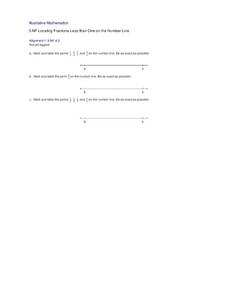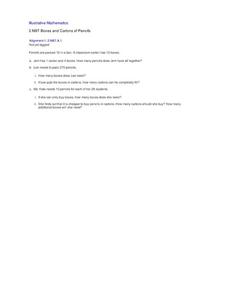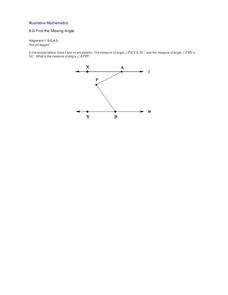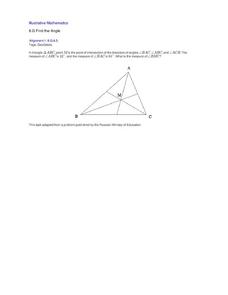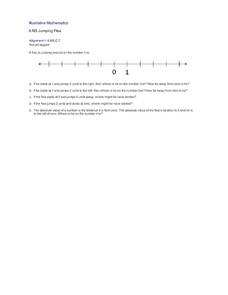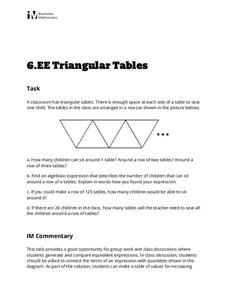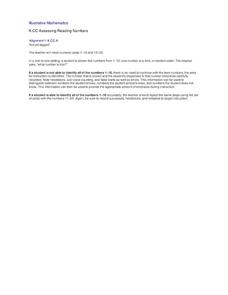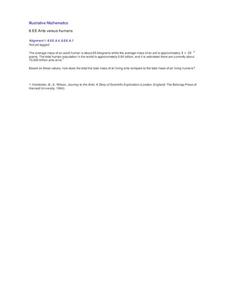Illustrative Mathematics
Sugar in Six Cans of Soda
Understanding how to multiply a whole number by a fraction is the key concept. Young mathematicians create a visual model of this real-world example and find the solution. Extensions are possible for making this an even richer activity....
Illustrative Mathematics
Comparing Temperatures
Which is colder -12 or -18? Temperature is natural real-world application of ordering rational numbers. It's also fun to talk about the lowest recorded temperature on Earth. Take the time to discuss this inquiry with your class.
Illustrative Mathematics
Above and below sea level
Using the real-world example of elevation, above or below sea level, young mathematicians interpret expressions using negative signs, and absolute value. This task provides a good opportunity to discuss the notion of magnitude and...
Illustrative Mathematics
Running Laps
If you run more laps, did you run further? Well, it depends. If the laps are different lengths, you need to do some math to answer that question. The goal of this task to is compare two fractions. Young learners represent the real-world...
Illustrative Mathematics
Locating Fractions Less than One on the Number Line
Understanding where to place a fraction on a number line is key to understanding fractions as numbers. This activity focuses on locating fractions less than one. Learners need to partition the line into the correct number of equal sized...
Illustrative Mathematics
Boxes and Cartons of Pencils
Boxes and cartons of pencils are a natural, real-world example for understanding bundles of ten and their relationship to a hundred. When you have many cartons, you can discuss place value, and how to represent multiple hundreds.
Illustrative Mathematics
Find the Missing Angle
This one activity requires young geometers to pull together information they are currently learning with things they have learned previously. Here they rely on understanding something about parallel lines, alternative interior angles,...
Illustrative Mathematics
Find the Angle
This a fun problem for young geometers to play with while gaining important insight into deductive reasoning. Some will find the answers very quickly, others might take a less direct path, but all will use their knowledge of the sum of...
Illustrative Mathematics
Box of Clay
What happens to a volume when you scale the dimensions of a rectangular prism? In this problem, a box of clay is increased in each dimension, with the intent to see if learners can generalize the result. The addition of...
Illustrative Mathematics
Cari's Aquarium
The volume of a fish tank is a rather important measure when it comes to building an aquarium for different species of fish. In this problem, your kids look at how many different ways they can make a fish tank of a specific volume,...
Illustrative Mathematics
Grass Seedlings
Plants never grow at the same rate, and that is the antithesis for this word problem involving multiplication of fractions. On the worksheet, Raul notices that Pablo's seedlings are 1 1/2 times as tall, and Celina's seedlings are 3/4 as...
Illustrative Mathematics
Origami Stars
This one problem concentrates on the important concept of dividing a whole number by a unit fraction. Here, young mathematicians use pictures they draw to help answer this problem. Insight into the connection between multiplication and...
Illustrative Mathematics
Painting a Room
This real-life math problem concentrates on developing the understanding of dividing a unit fraction by a whole number. It allows learners to draw out a solution to aid their thinking. The well-written answer sheet describes common...
Illustrative Mathematics
Jumping Flea
Mathematics minors consider the magnitude of a jumping flea as he hops from place to place. Through this exercise, they will investigate absolute values, as well as positive and negative rational numbers on a number line. The first page...
Illustrative Mathematics
6.EE.4 Equivalent Expressions
Straight to the point, learners are asked to compare a set of five expressions, determine which are equivalent, and then write equivalent equations for those that do not have any. A benefit is that they will review using properties...
Illustrative Mathematics
Triangular Tables
Somewhat of a puzzle, this problem gets pre-algebra preteens to write an expression representing a seating chart using triangle-shaped tables. This single task is an applicable lesson for meeting sixth grade Common Core math standards....
Illustrative Mathematics
Distance to School
A single problem requires learners to write two expressions representing the total distance between a student's home and school over a time span of four weeks. A thorough commentary follows that will help you explore the solutions with...
Illustrative Mathematics
The Marble Jar
A jar is filled with 1,500 marbles and customers of a bank can enter a contest to guess the correct percentage of blue marbles. How can an employee at the bank estimate the actual percentage without physically counting all 1,500 marbles?...
Illustrative Mathematics
Block Scheduling
If a random sample determines that 45% of students favor block scheduling, is it possible that the actual percentage might be 50% or 60%? In this task, learners use data from a computer-generated simulation to determine the plausibility...
Illustrative Mathematics
Assessing Reading Numbers
Youngsters develop their number sense by rote counting from one to ten. Over time, they identify the numbers on their own and no longer rely on fixed recitation. Using numerical flashcards, a teacher will randomly choose numbers from the...
Illustrative Mathematics
Average Cost
Here is an activity that presents a good example of a function modeling a relationship between two quantities. John is making DVDs of his friend's favorite shows and needs to know how much to charge his friend to cover the cost of making...
Illustrative Mathematics
Influenza epidemic
This activity presents a real-world problem about an epidemic of influenza spreading through a city. Learners refer to a graph that shows the number of individuals infected in relation to the number of weeks that have elapsed since...
Illustrative Mathematics
Graphs of Quadratic Functions
The equations look different, but their graphs are the same. How can that be? This activity leads your mathematicians in an exploration of three different forms of the same quadratic function. After comparing the equations, their graphs,...
Illustrative Mathematics
Ants Versus Humans
You would think that humans make up more mass than ants do on this planet, but think again, and this time by performing calculations. Middle schoolers use scientific notation to compute and compare the estimated total mass of all humans...






